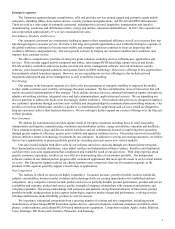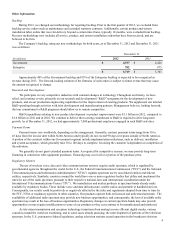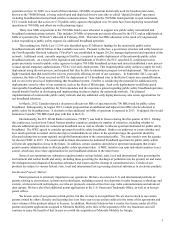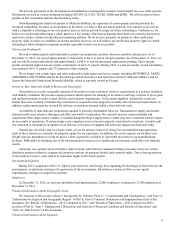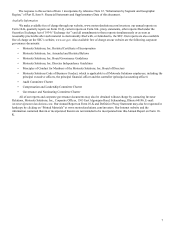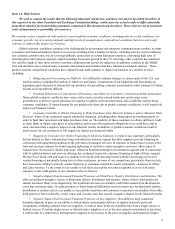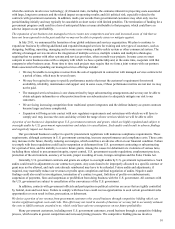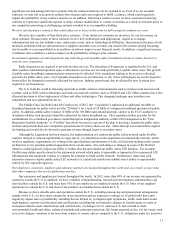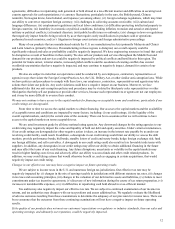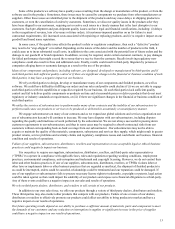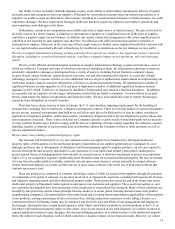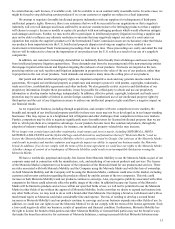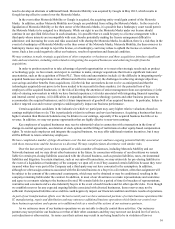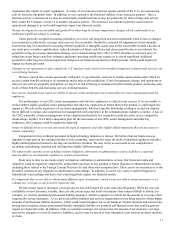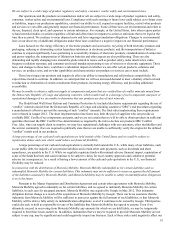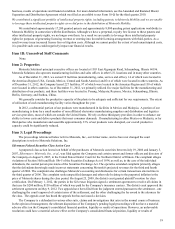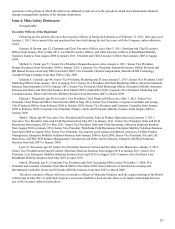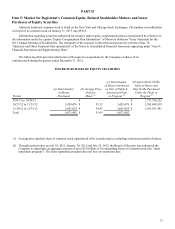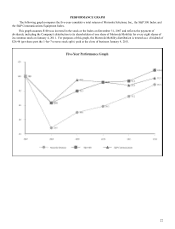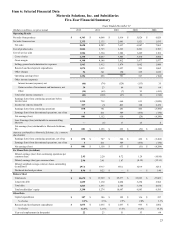Motorola 2012 Annual Report Download - page 21
Download and view the complete annual report
Please find page 21 of the 2012 Motorola annual report below. You can navigate through the pages in the report by either clicking on the pages listed below, or by using the keyword search tool below to find specific information within the annual report.13
Some of the products we sell may have quality issues resulting from the design or manufacture of the product, or from the
software used in the product. Sometimes, these issues may be caused by components we purchase from other manufacturers or
suppliers. Often these issues are identified prior to the shipment of the products and may cause delays in shipping products to
customers, or even the cancellation of orders by customers. Sometimes, we discover quality issues in the products after they
have been shipped to our customers, requiring us to resolve such issues in a timely manner that is the least disruptive to our
customers. Such pre-shipment and post-shipment quality issues can have legal and financial ramifications, including: (i) delays
in the recognition of revenue, loss of revenue or future orders, (ii) customer-imposed penalties on us for failure to meet
contractual requirements, (iii) increased costs associated with repairing or replacing products, and (iv) a negative impact on our
goodwill and brand name reputation.
In some cases, if the quality issue affects the product's safety or regulatory compliance, then such a “defective” product
may need to be “stop-shipped” or recalled. Depending on the nature of the defect and the number of products in the field, it
could cause us to incur substantial recall costs, in addition to the costs associated with the potential loss of future orders and the
damage to our goodwill or brand reputation. In addition, we may be required, under certain customer contracts, to pay damages
for failed performance that might exceed the revenue that we receive from the contracts. Recalls involving regulatory non-
compliance could also result in fines and additional costs. Finally, recalls could result in third-party litigation by persons or
companies alleging harm or economic damage as a result or the use of the products.
Many of our components and products, including software, are designed, developed or manufactured by third-parties and if
such third-parties lack sufficient quality control or if there are significant changes in the financial or business condition of such
third-parties, it may have a negative impact on our business.
We rely on third-parties to design, develop or manufacture many of our components and finished products, as well as
software. We could have difficulties fulfilling our orders and our sales and profits could decline if (i) we are not able to engage
such third-parties with the capabilities or capacities required by our business, (ii) such third-parties lack sufficient quality
control and fail to deliver quality components or products on time and at reasonable prices or deliver products that do not meet
regulatory or industry standards or requirements, or (iii) if there are significant changes in the financial or business condition of
such third-parties.
We utilize the services of subcontractors to perform under many of our contracts and the inability of our subcontractors to
perform could cause our products or services to be produced or delivered in an untimely or unsatisfactory manner.
We engage subcontractors on many of our contracts and as we expand our global solutions and services organization our
use of subcontractors has and will continue to increase. We may have disputes with our subcontractors, including disputes
regarding the quality and timeliness of work performed by the subcontractor. We are not always successful in passing down
customer requirements to our subcontractors, and thus in some cases may be required to absorb contractual risks from our
customers without corresponding back-to-back coverage from our subcontractor. Our subcontractors may not be able to
acquire or maintain the quality of the materials, components, subsystems and services they supply, which might result in greater
product returns, service problems and warranty claims and regulatory compliance issues and could harm our business, financial
condition and results of operations.
Failure of our suppliers, subcontractors, distributors, resellers and representatives to use acceptable legal or ethical business
practices could negatively impact our business.
It is our policy to require our suppliers, subcontractors, distributors, resellers, and third-party sales representatives
(“TPSRs”) to operate in compliance with applicable laws, rules and regulations regarding working conditions, employment
practices, environmental compliance, anti-corruption and trademark and copyright licensing. However, we do not control their
labor and other business practices. If one of our suppliers, subcontractors, distributors, resellers, or TPSRs violates labor or
other laws or implements labor or other business practices that are regarded as unethical, the shipment of finished products to
us could be interrupted, orders could be canceled, relationships could be terminated and our reputation could be damaged. If
one of our suppliers or subcontractors fails to procure necessary license rights to trademarks, copyrights or patents, legal action
could be taken against us that could impact the salability of our products and expose us to financial obligations to a third-party.
Any of these events could have a negative impact on our sales and results of operations.
We rely on third-party dealers, distributors, and retailers to sell certain of our products.
In addition to our own sales force, we offer our products through a variety of third-party dealers, distributors and retailers.
These third-parties may also market other products that compete with our products. Failure of one or more of our dealers,
distributors or retailers to effectively promote our products could affect our ability to bring products to market and have a
negative impact on our results of operations.
Our future operating results depend on our ability to purchase a sufficient amount of materials, parts and components to meet
the demands of our customers and any reduction or interruption in supplies or significant increase in the price of supplies
could have a negative impact on our results of operations.


